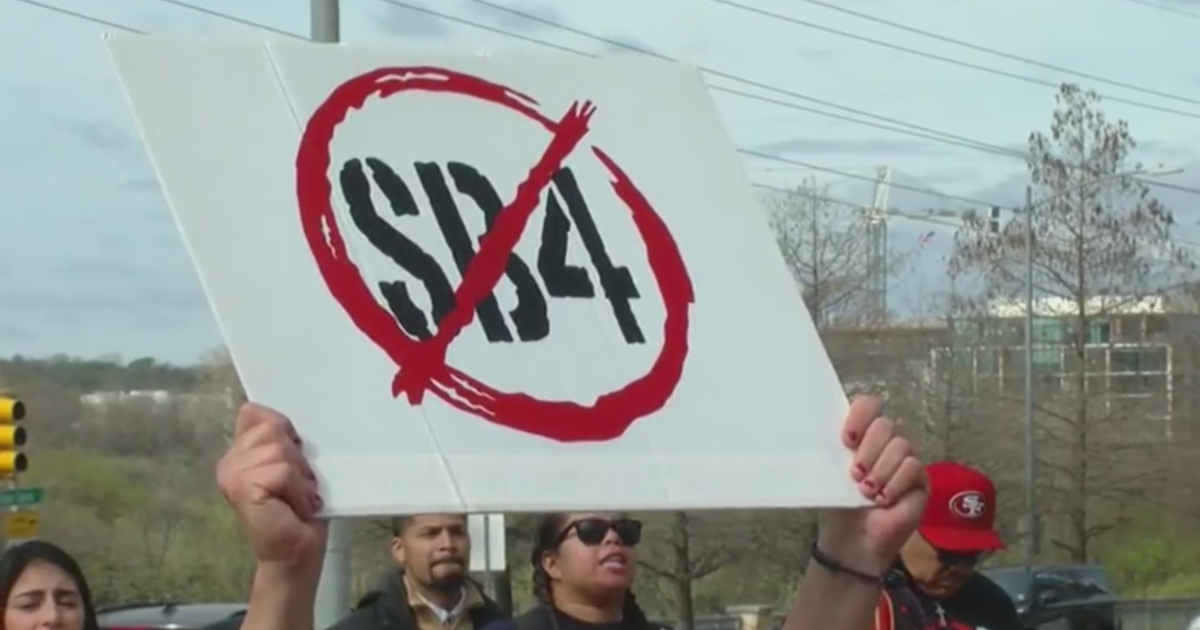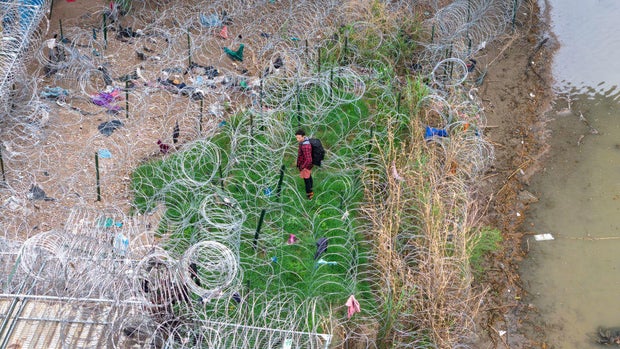CBS News
Appeals court keeps hold on Texas’ SB4 immigration law while it consider its legality

A panel of federal appeals court judges late Tuesday continued to block Texas from arresting and jailing migrants under a contentious state immigration law known as SB4, keeping a hold on the measure while it weighs its legality.
In a 2-1 decision, the panel of 5th Circuit Court of Appeals judges denied Texas’ request to suspend the lower court order that found SB4 unconstitutional and in conflict with federal immigration laws.
Pending further court action, Texas will continue to be prohibited from enforcing SB4, which would criminalize unauthorized immigration at the state level. The 5th Circuit has a hearing next week, on April 3, to consider the question of whether SB4 is lawful and constitutional.
Texas is defending SB4 from legal challenges filed by the Justice Department and two groups that advocate on behalf of migrants.
Passed by the Texas legislature last year, SB4 would create state crimes for entering or reentering the state from Mexico outside an official port of entry. These actions are already illegal under federal law.
Law enforcement officials, at the state, county and local level, would be authorized to stop, jail and prosecute migrants suspected of violating these new state criminal statutes. SB4 would also allow state judges to order migrants to return to Mexico as an alternative to continuing their prosecution.
Texas officials, including Gov. Greg Abbott, have touted the strict law as a necessary tool to combat illegal immigration. Accusing the Biden administration of not doing enough to deter migrants from coming to the U.S. illegally, Abbott has mounted an aggressive state border operation, busing tens of thousands of migrants to major cities and fortifying areas near the Rio Grande with razor wire, barriers and National Guard troops.
John Moore/Getty Images
But SB4 has garnered withering criticism from migrant advocates, the Biden administration and the Mexican government, which has denounced the Texas law as “anti-immigrant” and vowed to reject migrants returned by the state.
In its lawsuit against SB4, the Biden administration has argued the state measure jeopardizes diplomatic relations with Mexico, ignores U.S. asylum law and obstructs immigration enforcement, a longstanding federal responsibility.
Two judges on the 5th Circuit panel appeared to agree with the Biden administration’s arguments.
“For nearly 150 years, the Supreme Court has held that the power to control immigration—the entry, admission, and removal of noncitizens—is exclusively a federal power,” Chief 5th Circuit Judge Priscilla Richman wrote in the majority opinion on Tuesday.
“Despite this fundamental axiom, S. B. 4 creates separate, distinct state criminal offenses and related procedures regarding unauthorized entry of noncitizens into Texas from outside the country and their removal,” she added.
CBS News
Tajikistan nationals with alleged ISIS ties removed in immigration proceedings, U.S. officials say

When federal agents arrested eight Tajikistan nationals with alleged ties to the Islamic State terror group on immigration charges back in June, U.S. officials reasoned that coordinated raids in Los Angeles, New York and Philadelphia would prove the fastest way to disrupt a potential terrorist plot in its earliest stages. Four months later, after being detained in Immigration and Customs Enforcement (ICE) facilities, three of the men have already been returned to Tajikistan and Russia, U.S. officials tell CBS News, following removals by immigration court judges.
Four more Tajik nationals – also held in ICE detention facilities – are awaiting removal flights to Central Asia, and U.S. officials anticipate they’ll be returned in the coming few weeks. Only one of the arrested men still awaits his legal proceeding, following a medical issue, though U.S. officials speaking on the condition of anonymity to discuss the sensitive proceedings indicated that he remains detained and is likely to face a similar outcome.
The men face no additional charges – including terrorism-related offenses – with the decision to immediately arrest and remove them through deportation proceedings, rather than orchestrate a hard-fought terrorism trial in Article III courts, born out of a pressing short-term concern about public safety.
Soon after the eight foreign nationals crossed into the United States, the FBI learned of the potential ties to the Islamic State, CBS News previously reported. The FBI identified early-stage terrorist plotting, triggering their immediate arrests, in part, through a wiretap after the individuals had already been vetted by U.S. Customs and Border Protection, law enforcement sources confirmed to CBS News in June.
Several months later, their removals following immigration proceedings mark a departure from the post-9/11 intelligence-sharing architecture of the U.S. government.
Now facing a more diverse migrant population at the U.S.-Mexico border, a new effort is underway by the Department of Homeland Security, Department of Justice and the Intelligence Community to normalize the direct sharing of classified information – including some marked top-secret – with U.S. immigration judges.
The more routine intelligence sharing with immigration judges is aimed at allowing U.S. immigration courts to more regularly incorporate derogatory information into their decisions. The endeavor has led to the creation of more safes and sensitive compartmented information facilities – also known as SCIFs – to help facilitate the sharing of classified materials. Once considered a last resort for the department, Secretary Alejandro Mayorkas has sought to use immigration tools, in recent months, to mitigate and disrupt threat activity.
The immigration raids, back in June, underscore the spate of terrorism concerns from the U.S. government this year, as national security agencies point to a system now blinking red in the aftermath of the Oct. 7 attacks by Hamas on Israel, with emerging terrorism hot spots in Central Asia.
A joint intelligence bulletin released this month, and obtained by CBS News, warns that foreign terrorist organizations have exploited the attack nearly one year ago and its aftermath to try to recruit radicalized followers, creating media that compares the October 7 and 9/11 attacks and encouraging “lone attackers to use simple tactics like firearms, knives, Molotov cocktails, and vehicle ramming against Western targets in retaliation for deaths in Gaza.”
In May, ICE arrested an Uzbek man in Baltimore with alleged ISIS ties after he had been living inside the U.S. for more than two years, NBC News first reported.
In the past year, Tajik nationals have engaged in foiled terrorism plots in Russia, Iran and Turkey, as well as Europe, with several Tajik men arrested following March’s deadly attack on Crocus City Hall in Moscow that left at least 133 people dead and hundreds more injured.
The attack has been linked to ISIS-K, or the Islamic State Khorasan Province, an off-shoot of ISIS that emerged in 2015, founded by disillusioned members of Pakistani militant groups, including Taliban fighters. In August 2021, during the U.S. military withdrawal from Afghanistan, ISIS-K launched a suicide attack in Kabul, killing 13 U.S. service members and at least 170 Afghan civilians.
In a recent change to ICE policy, the agency now recurrently vets foreign nationals arriving from Tajikistan, Uzbekistan and other Central Asian countries, detaining them while they await removal proceedings or immigration hearings.
Only 0.007% of migrant arrivals are flagged by the FBI’s watchlist, and an even smaller number of those asylum seekers are ultimately removed. But with migrants arriving at the Southwest border from conflict zones in the Eastern Hemisphere, posing potential links to extremist or terrorist groups, the White House is now exploring ways to expedite the removal of asylum seekers viewed as a possible threat to the American public.
“Encounters with migrants from Eastern Hemisphere countries—such as China, India, Russia, and western African countries—in FY 2024 have decreased slightly from about 10 to 9 percent of overall encounters, but remain a higher proportion of encounters than before FY 2023,” according to the Homeland Threat Assessment, a public intelligence document released earlier this month.
A senior homeland security official told reporters in a briefing Wednesday, that the U.S. is engaged in an “ongoing effort to try to make sure that we can use every bit of available information that the U.S. government has classified and unclassified, and make sure that the best possible picture about a person seeking to enter the United States is available to frontline personnel who are encountering that person.”
Approximately 139 individuals flagged by the FBI’s terror watchlist have been encountered at the U.S.‑Mexico border through July of fiscal year 2024. That number decreased from 216 during the same timeframe in 2023. CBP encountered 283 watchlisted individuals at the U.S.-Canada border through July of fiscal year 2024, down from 375 encountered during the same timeframe in 2023.
“I think one of the features of the surge in migration over recent years is that our border personnel are encountering a much more diverse and global population of individuals trying to enter the United States or seeking to enter the United States,” a senior DHS official said. “So, at some point in the past, it might have been primarily a Western Hemisphere phenomenon. Now, our border personnel encounter individuals from around the world, from all parts of the world, to include conflict zones and other areas where individuals may have links or can support ties to extremist or terrorist organizations that we have long-standing concerns about.”
In April, FBI Director Christopher Wray warned that human smuggling operations at the southern border were trafficking in people with possible connections to terror groups.
“Looking back over my career in law enforcement, I’d be hard-pressed to think of a time when so many different threats to our public safety and national security were so elevated all at once, but that is the case as I sit here today,” Wray, told Congress in June, just days before most of the Tajik men were arrested.
The expedited return of three Tajiks to Central Asia required tremendous diplomatic communication, facilitated by the State Department, U.S. officials said.
Returns to Central Asia routinely encounter operational and diplomatic hurdles, though regular channels for removal do exist. According to agency data, in 2023, ICE deported only four migrants to Tajikistan.
Robert Legare and
contributed to this report.
CBS News
Here Comes the Sun: Ralph Macchio and more

Watch CBS News
Be the first to know
Get browser notifications for breaking news, live events, and exclusive reporting.
CBS News
The Depraved Heart Murder – CBS News

Watch CBS News
Be the first to know
Get browser notifications for breaking news, live events, and exclusive reporting.









